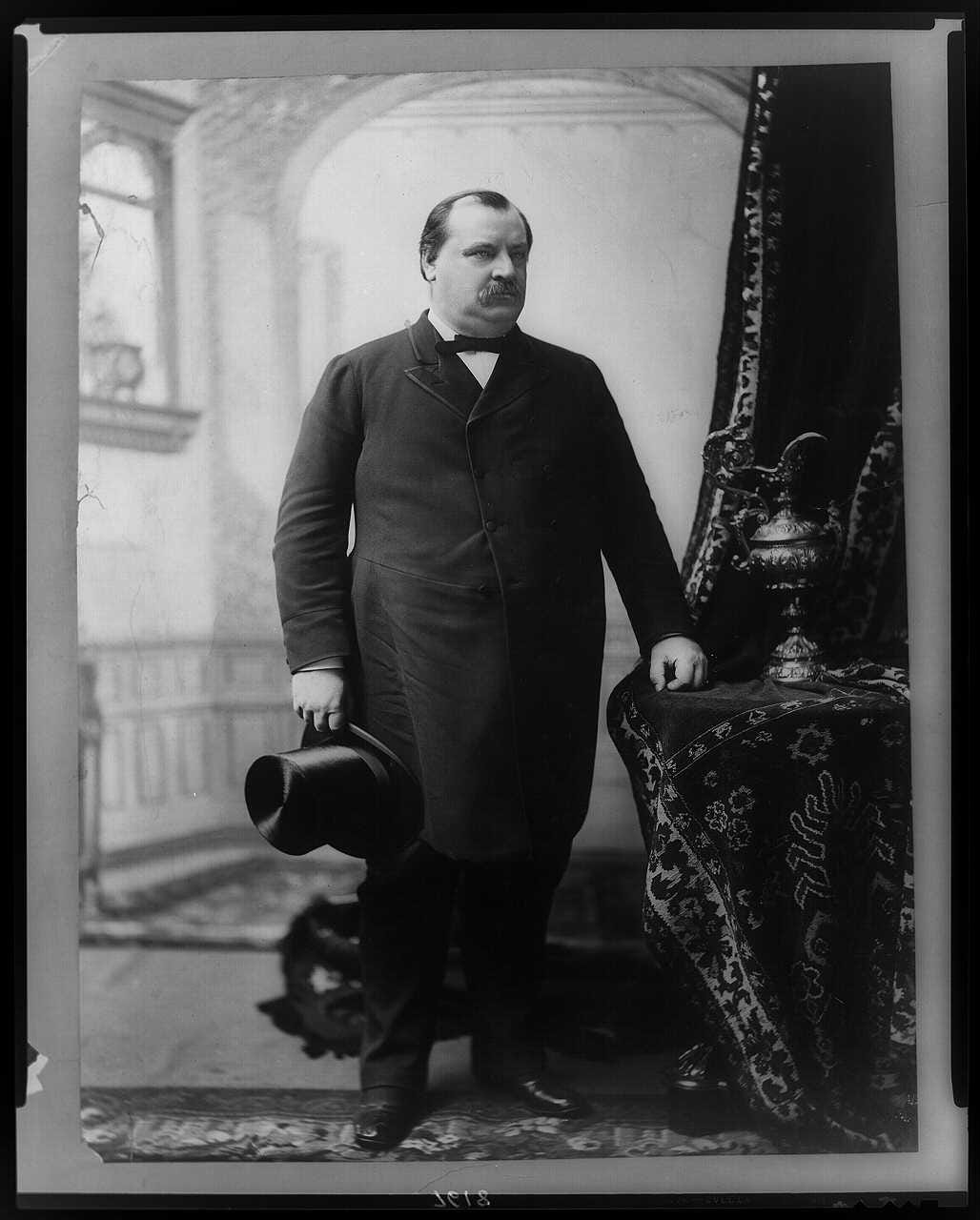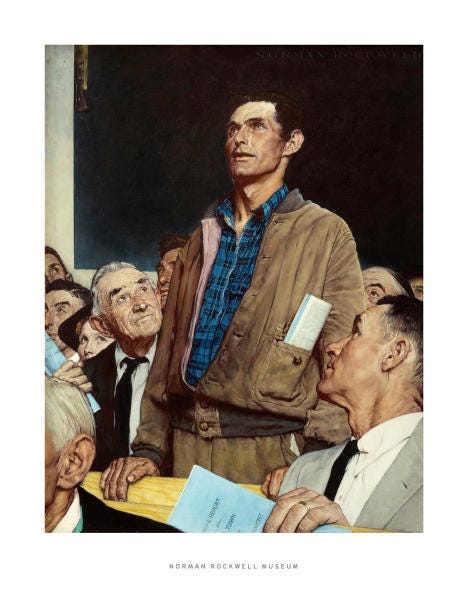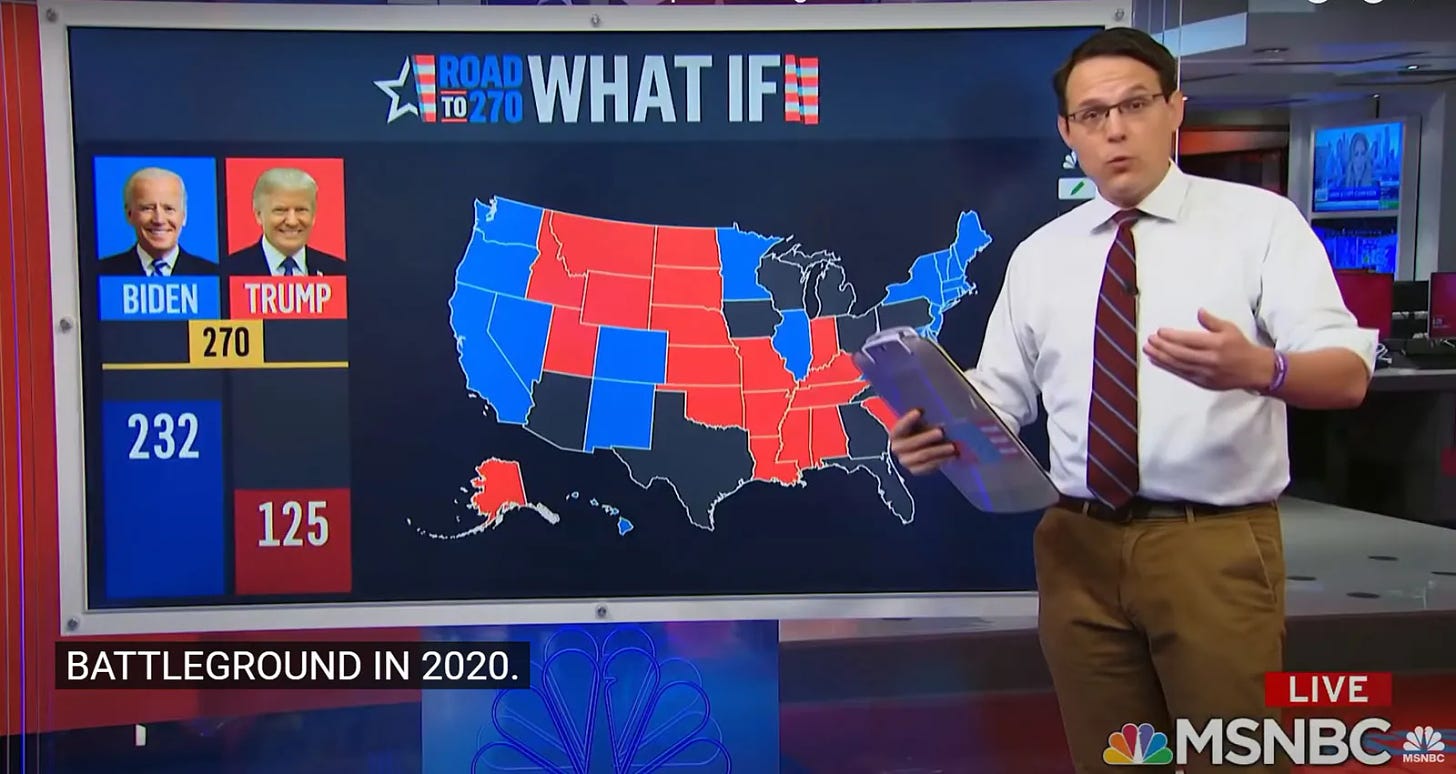It’s impossible for your vote to matter -- so vote anyway
Even though no single vote determines the winner, there are good reasons to vote
Note: this edition is not paywalled because it concerns a civic issue relevant to everyone.
In a statistics class you may hear: the adult population of France is 42 million. The chance of any French adult being president of that country is one in 42 million. Therefore, nobody is president of France.
This is given as an example of how numbers that are, themselves, accurate can lead to a flawed conclusion.
The same applies to Tuesday’s election of the next president of the United States. It’s unlikely to the point of astronomical that any one person’s vote will determine the outcome.
This is amplified by America’s suis generis Electoral College system, which in effect voids about two thirds of the nation’s votes. If you live in a bright blue or deep red state, as the majority of Americans do, whether you personally vote is irrelevant to the outcome.

That the Electoral College increases cynicism about U.S. democracy is among the many reasons we should switch to direct election of the president and vice president. The arguments are here.
In local races – city council, county judges, school boards – turnout may be low enough that individual votes matter. The machine at the center of Chicago politics, for instance, has controlled that great city for nearly a century on the simple insight that if every patronage jobholder and public union member turns out, that’s enough to swamp the votes of opponents, independents and goo-goos, because the vote total is relatively low.
Goo-goos is Chicago slang for reformers – those silly people who advocate good government.
Presidential elections are different. In the 2020 presidential election, 158,397,726 people voted. Among 158 million ballots, what are the chances any one person’s vote mattered? Vanishingly small.
Yet… France has a president. Super-unlikely events do happen.
Perhaps we should vote as an expression of civic duty. There is something about Americans trekking to the polls, being with their neighbors, showing concern for the polity as they choose new leaders. Even if you don’t like the choice, voting demonstrates the American experiment remains ongoing, that people care about the United States.
I’ll be at my local polling place on Tuesday. There’s nothing wrong with early voting or mail voting -- vote by mail has worked well in Oregon, without fraud. But unless I were ill, I wouldn’t miss the carrying out of the civic ritual of going to the polls with neighbors and friends.
Getting the I VOTED sticker gives me a feeling of accomplishment, even if, statistically, that fact I voted matters little.
Two weeks ago, aged 100, Jimmy Carter went to a Georgia polling place to early-vote his ballot. He had assistance, of course. But if a centenarian can get out and vote – what’s your excuse?

If you don’t vote, then someone you oppose wins by a whisker, you’ll feel bad, and won’t get a do-over.
Well.. maybe in Pennsylvania, where this year, as in 2020, voting will continue for three days after the election ends. This is a clear violation of the Constitution, which at Article II, Section 1:4, specifies Congress determines the day for “chusing” presidential electors, and states cannot alter that day.
In 2020 your writer was relieved Biden would have won without Pennsylvania’s Electoral College ballots, as there was pervasive after-hours voting monkey business in the Keystone State. If the Trump-Harris contest comes down to Pennsylvania, we may have another 2000-in-Florida situation of rancor and legal challenges. Nobody needs that.
While it is statistically unlikely your vote will determine an outcome, it’s statistically unlikely any particular lotto ticket will win. One does.
In 2000 George W. Bush became president by a margin of 537 votes cast in Florida – 537 out of 5,825,043, a ten-thousandths of a percent of the Florida vote.
Bush was the bona-fide winner, details are here. But had a small number of Gore supporters in Florida who didn’t turn out in 2000 gone to their local polling place, recent American history would be very different.
Tiny margins determined the presidential victor in 1884, 1960, 2000, 2004 and 2016.
Grover Cleveland won in 1884 on the basis of a 1,149-vote margin in New York State, less than one one-thousandths of the vote. In 1960 John Kennedy won the popular vote by one-tenth of one percent of the vote cast that year. In 2004, a shift of two percent of the vote in Ohio would have made John Kerry president. Trump won Michigan 2016 by about one fifth of one percent of votes cast in that state. In 2016 Trump won Wisconsin and Pennsylvania by less than one percent of each state’s vote.
Presidential balloting often comes down to small numbers in battleground states, even small numbers in specific precincts.
If you live in California or Tennessee, you already know where your state’s electors will go. Even so you should vote, to increase the popular vote margin of your candidate.
Third time I’ve thought of a reason to show Buffalo’s own Grover Cleveland in All Predictions Wrong. Image courtesy Library of Congress.
The popular vote is a factor in a president’s political capital. When in 2000 George W. Bush won the White House without the popular vote, he was a weak president until 9-11 reshuffled the deck.
If Trump wins again without the popular vote, he will be a weak lame duck. So if you back Trump, go vote for him! If you back Harris, go vote for her!
I’ll be with my neighbors at the polling place voting Harris, knowing that my state, Maryland, is certain to pledge its electors to her no matter what I do.
My hope is Harris wins by a comfortable margin, so the stolen-election claims – which Democrats make just as often, and just as implausibly, as Republicans – finally cease.
But if Trump wins, may he get a comfortable margin, to avoid more stop-the-steal nonsense: and in this case, force the Democratic Party to reassess why so many mainstream voters reject its nostrums.
Whichever side wins the White House, I hope the other takes at least one chamber of Congress, to provide checks-and-balances. Right now the whole system is so polarized, I would not trust either party with full control.
Freedom of Speech by Norman Rockwell, 1943. Image courtesy Rockwell Museum.
Perhaps in 2028 we can have a new-faces issues-based presidential race. Gina Raimondo, Phil Scott, Gretchen Whitmer, Josh Shapiro, Francis Suarez, Regina Romero, Eric Johnson – these and others would make fine presidential candidates in 2028.
Let’s hope Trump-Harris finally gets the political gunk out of our system and allows for a reboot.
What can you personally do about that? Cast your vote!
Bonus: Readers including Joe Orbach are noting that as-published this essay skipped a good argument for voting. Even if you already know which presidential candidate will receive your state’s electors, you can still vote for your member of the House of Representatives; in some years, vote for a senator; vote in local races where your vote might influence the outcome; and vote on ballot initiatives.
Bonus: Things to Remember on Election Day.
No matter what happens, someone will proclaim a “permanent realignment of American politics.” Permanent realignments are often proclaimed – remember the Southern Strategy? – and last about as long as a carton of milk.
Bitterness and vindictive comments have been too common in the 2016, 2020 and 2024 elections. And before: the political strategist Kevin Phillips, 1940-2023, who coined the term Southern Strategy, once said, "The whole secret of politics is knowing who hates whom.” We’ve got the greatest country in the world, and people are mad as hell about it! They’ve been mad as hell about it for generations!
If Trump wins, don’t panic. He’s not going to “cancel the Constitution.” He can’t.
If Harris wins, don’t panic. She’s not going to “impose socialism.” She can’t.
After losing a presidential election, partisans always foresee doom for American democracy. It’s never happened and I’ve got ten bucks that says it never will.
Bonus: Behind the Blue Wall. As of Thursday, Real Clear Polling puts Wisconsin, Michigan and Pennsylvania – the Democratic Party’s Blue Wall – into the tossup category.
A generation ago it seemed impossible the Blue Wall would crumble. But years of the MSM, Hollywood and Hillary Clinton sneering at ordinary Americans accomplished the task.
At this juncture it should be renamed the Teal Shower Curtain.
Get ready to hear about Zip codes in Maricopa County. Photo courtesy NBC News.
Bonus: Farewell, Steve Kornacki. States (sometimes counties) should not report their results drip-drip-drip. The entire state should say nothing until the final vote count is announced.
Drip-drip-drip vote reports keep Steve Kornacki busy, and provide TV talking heads something to fill airtime.
But they create phony narratives – “she’s gaining momentum in southwest Arizona… he’s ahead of expectations in the Florida panhandle…” Drip-drip-drip results make it seem like everything’s under the control of some secret organization that decides when the public may be allowed to know information.
States dictate the “manner” of presidential elections but Congress can impose rules. A rule that’s needed: no partial results. One single announcement only.
Bonus: Voter ID. Requiring a voter ID seems to me perfectly reasonable. Indiana’s law, which has been upheld by federal courts, is a good model. Requiring identification would silence claims of voter fraud, the Sasquatch of contemporary politics – many say it’s there, no one can produce proof.
The memes Elon Musk promotes, listing states that do not require photo ID to vote, enfold half-truths.
In my state, Maryland, you don't show a photo ID but must demonstrate you know the home address and correct spelling of the name of the registered voter you claim to be. You can't just waltz in and vote (or Walz in) as Musk implies. After you vote, the poll judge marks your registration as having cast a ballot so no one else can double-vote your slot.
In some ways this is better security than a blurry embossed photo.
Bonus: The Exam for a Commercial Poetic License Is Brutal. If it’s true Sixty Minutes edited Kamala Harris’s responses to remove her stumbles, this is yet another stake in the heart of the MSM, yet again self-inflicted.
The New York Times, The Atlantic and the New Yorker believe it’s their role to pick the next president. It was healthy to see the Washington Post and Los Angeles Times step away from that. Not showing obvious favoritism will help the MSM recover from its low public standing.
Get mad at newspapers! That’s healthy. But don’t cancel. The world needs journalism.
The Washington Post went THUNK in my driveway this morning, and I hope it always will. The next Tuesday Morning Quarterback will include an ode to newspapers.
For his part, Donald Trump asserted “CBS should lose its broadcast license” over manipulation of the Harris interview.
Individual stations (KCAL in Los Angeles, WFOR in Miami, etc.) need broadcast licenses because they transmit over public frequencies. Networks are consortia of individual stations, and not licensed.
Yet another instance of Trump, a four-year president who seeks the presidency again, not knowing fundamentals of American civics.
My worry is that if Trump is reelected, he will revoke my poetic license.
About All Predictions Wrong
In addition to TMQ on Tuesday through the NFL season, there will be an All Predictions Wrong, on an eclectic range of topics, on most Fridays, plus bonus editions depending on news events.
A subscription to All Predictions Wrong includes Tuesday Morning Quarterback, so it’s two-for-one.





I am not an American citizen, but like the rest of the world, I am watching this election with a combination of hope and dread. From what I can see, most Americans proclaim that they are either Democrats or Republicans, just like saying you're Christian, Catholic, Jewish, Muslim, etc. It must be hard to fight that internal push to vote within your chosen tribe. But I am asking all of you to vote with your heart and logic, and try very hard to forget about what you historically belong to. Examine what has been said, what has been promised, and what your country will be like depending on who wins the election. And know something else - not voting then eliminates your right to complain. Sounds perhaps like a cliche, but if you want to live in a true Democracy, then practice what makes it so. I believe this to be the most important election since Abraham Lincoln put your country onto a new and enlightened path. Good fortune to you all.
I'm from a country that has had voter's IDs for over 30 years now. There are still claims of fraud after every single election. It's not the magical solution you think it is. Losing side can make up whatever they want and there will always be a lot of people who believe them.